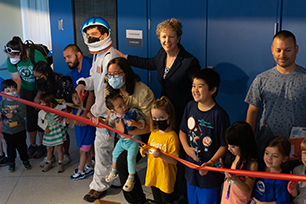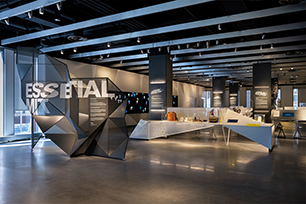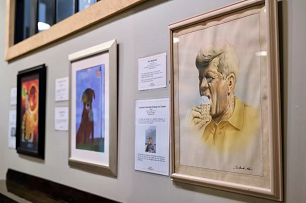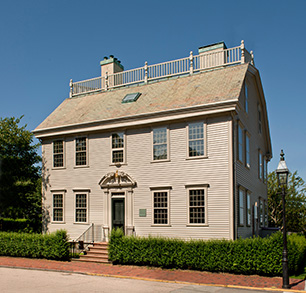Connecticut
The Lockwood-Mathews Mansion Museum was recently awarded a grant in the amount of $20,320 from Connecticut Humanities to support their participation in the CT Summer at the Museum initiative. The program invited Connecticut children aged 18 and under, plus one accompanying Connecticut resident adult to visit participating museums free of charge from July 1 through September 5, 2022. Funding for the initiative was provided by the CT General Assembly, with the support of Connecticut Humanities and the Department of Economic and Community Development, Office of the Arts, which also receives support from the federal American Rescue Plan.
Stanley-Whitman House recently produced its first two major publications: Memento Mori Farmington, Connecticut: Remember Death is a richly photographed celebration of Memento Mori Cemetery in Farmington, CT and twenty-two of the town’s founding members buried there; The Journal of Farmington History, Volume 1 is the inaugural illustrated collection of articles by local historians on subjects ranging from local figures and artifacts to nationally known pioneers. Both books are available online and at the museum. Stanley-Whitman House was also selected for a $3,000 Museum Makeover grant, a Conservation ConneCTtion, CLHO and CT Humanities-funded program designed to improve the visitor experience at cultural heritage organizations throughout Connecticut. By aiding in the Museum’s redesign of its Nancy Conklin Exhibit Gallery, the grant will allow Stanley-Whitman House to more effectively tell the hard histories of Indigenous erasure and the enslavement of captive peoples, a particular challenge for a colonial museum.
The William Benton Museum of Art received accreditation by the American Alliance of Museums in June, 2022. The Mattatuck Museum was also reaccredited. The Accreditation Program helps to ensure the integrity and accessibility of museum collections, reinforce the educational and public service roles of museums, and promote good governance practices and ethical behavior.
Congratulations to the following NEMA members that have received a recent CT Humanities Quick Grant:
- Connecticut Historical Society: $ 3,750, The Bicycle Game exhibition
- Kent Historical Society: $3,750, Kent Before Cameras: When Ammi Painted the Town,
- Webb-Deane-Stevens Museum: $3,750, Webb Barn Traditional Music Festival.
Massachusetts
The Buttonwoods Museum is embarking on a new project called Revitalize Buttonwoods: Restore the Past, Shape the Future. A four-year, $100,000 grant will fund the renovation of educational programs, to include the voices of historically excluded community members - Indigenous people, all people of color, LGBTQA+ people, disabled people, and women. Funding will offset the cost of busing students from public and private schools to the museum for programs. The museum will form an inclusive and diverse Advisory Committee that will make decisions about future educational programs and exhibits under the guidance of the Director and Museum Educator. All exhibits and most programs going forward will be bilingual in English and Spanish to meet the needs of Haverhill's population, which is 22% native Spanish speakers. In addition, the museum will undertake a physical renovation to update the main exhibit gallery and Visitor Center. The new programming and renovation are goals that the museum has worked towards for the past five years by completing two MAPS Assessments, developing an interpretive plan in collaboration with a museum consultant, and undertaking an 18-month-long exhibition and design process.
The Iris and B. Gerald Cantor Art Gallery, at the College of the Holy Cross in Worcester, recently received a $100,000 grant from the National Endowment of the Humanities to fund “Bringing the Holy Land Home: The Crusades, Chertsey Abbey, and the Reconstruction of a Medieval Masterpiece.” The exhibition scheduled for 2023, and guest curated by Amanda Luyster, will explore the impact that art objects manufactured far away, particularly in the Byzantine and Islamic Mediterranean, had on the medieval visual culture of England and western Europe more broadly. The exhibition takes as its starting point the iconic Chertsey tiles, on loan from the British Museum, and will also include items from the collection of the Metropolitan Museum of Art, the Morgan Library & Museum in New York City, the Dumbarton Oaks Collection in Washington, DC, Harvard University Art Museums, the Boston Museum of Fine Arts, and the Worcester Art Museum. In addition to the NEH grant, generous support has been provided by the Gladys Krieble Delmas Foundation, the Mary Jaharis Center for Byzantine Art and Culture, and the ICMA (International Center of Medieval Art). Associated research was funded by the Paul Mellon Centre for British Art. A symposium focusing on the exhibition will take place on campus on March 25, 2023. The symposium will be held under the auspices of the NEMC (New England Medieval Consortium) and is supported by the Samuel H. Kress Foundation and the Rev. Michael C. McFarland S.J. Center for Religion, Ethics and Culture.
Historic Deerfield announces plans to install Witness Stones this Fall. Over a third of the households on Deerfield’s mile-long village street included at least one enslaved person by the mid-18th century. These stones will honor the humanity and contributions of the enslaved people who were an integral part of this community. Historic Deerfield is an affiliate of The Witness Stones Project, a non-profit organization based in Guilford, CT. The installation of Witness Stones Memorials at sites along the street where enslaved men, women, and children lived and worked is an essential element in our ongoing initiative to share this history with visitors to Deerfield. A dedication ceremony will be held in Deerfield on October 12. In addition, a walking tour mobile app, Encountering Pocumtuck: A Walk through Deerfield’s Indigenous History, will launch at Historic Deerfield this fall. The app is sponsored by the National Endowment for the Humanities. Dr. Margaret Bruchac, an Indigenous scholar and historian, will guide listeners in exploring 16 stops that reveal evidence of Pocumtuck life, culture, and history in the surrounding landscape.

Alden Planetarium ribbon cutting.
The EcoTarium Museum of Science and Nature completed a $1.6 million renovation of the Alden Planetarium, which reopened in June 2022. Renovations to the full-dome planetarium include all new technology with state-of-the-art 4K laser projection and surround sound, new lighting controls, tilted seating, carpeting, HVAC, structural work, and electrical upgrades. The Alden Planetarium now offers an immersive experience as visitors explore the wonders of the universe. The Alden Planetarium offers public shows daily, in addition to private bookings and events.
The Emily Dickinson Museum reopened in August after more than two years of renovations. As part of a grant funded effort, scholars consulted Dickinson’s poetry and other writings in order to look for clues about how to more accurately furnish the house as it would have appeared during her lifetime. The museum restored architectural elements like the original door and floorboards and recreated decorative details such as historic wallpaper. They also installed environmentally friendly heating and cooling systems.
The Baker-Polito Administration recently announced the awarding of $12.6 million in grants to support 27 local planning and shoreline management projects to aid Massachusetts’ coastal communities in preparing for severe coastal storms and the impacts of climate change, including storm surge, flooding, erosion, and sea level rise. The House of Seven Gables Settlement Association received a $509,919 grant and will prepare an adaptation plan that identifies short-, medium-, and long-term actions to improve the resilience of its campus and buildings to anticipated changes in groundwater elevation, precipitation, storm intensity, and sea level rise.
Longfellow House-Washington's Headquarters National Historic Site is celebrating its 50th anniversary as a unit of the US National Park System this year. More information is available at Longfellow House-Washington’s Headquarters National Historic Site at 50 Years

MIT Museum
The MIT Museum will reopen on October 2 in a new home in Kendall Square. This will be the first opportunity for many visitors to access the museum since MIT closed public buildings early in the pandemic. Opening festivities will include a Cambridge Community Day on October 1 for local residents, and a reimagined Cambridge Science Festival from October 3-9. Founded in 2007, the Cambridge Science Festival is a week of events, demonstrations, workshops and performances.
The General Society of Mayflower Descendants, more commonly known as the Mayflower Society, is celebrating its 125th year of existence. Founded in 1897, it is constituted by 54 member societies and approximately 32,000 members. The Mayflower Society recently issued a new logo as part of the commemoration. Its Mayflower Society house, 4 Winslow Street, Plymouth MA, was originally constructed in the 1750’s by the great grandson of Mayflower passenger Edward Winslow, and enlarged and expanded in the 1890’s by Joseph Everett Chandler. It is currently undergoing restoration and renovation work on its interior and exterior. As part of that project, the Mayflower Society recently received a $200,000.00 grant from the Massachusetts Cultural Council’s Cultural Facilities Fund, and a $50,000.00 grant from the Plymouth Community Charitable Foundation. The second of the grants is earmarked for the installation of a new handicap ramp into the Mayflower Society house.

Museum of Bad Art
The Museum of Bad Art reopened on September 6 in a new space at Dorchester Brewing Company. The irreverent “world’s only museum dedicated to the collection, exhibition and celebration of art in all its forms” has been without a home for two years thanks to the pandemic. The new gallery inside Dorchester Brewing Company is open free of charge and features about 40 works from MOBA’s collection of more than 800 pieces.

The Museum of Fine Arts, Boston is excited to unveil their new visual identity, describing the new look as being “inspired by our welcoming spirit, designed for the vibrant future that lies ahead of us.” Noting that this change signals an ongoing commitment to make MFA Boston a space where people of all backgrounds feel welcome, they have paired the new visual identity with a new promise: “Here all belong.” In support of this goal of inclusion, the museum has eliminated unpaid internships, offers opportunities to see “The Obama Portraits Tour” for free, and is displaying artworks submitted by the community in the accompanying “Portraits of Leadership” project.
Since the reopening of museums in Salem after the COVID-19 lockdown, Peabody Essex Museum (PEM) has held ESL and citizenship instruction in classes at PEM in collaboration with The House of Seven Gables Settlement Association. Through the partnership. PEM supplies not only well-ventilated classrooms but guided tours of exhibitions and complimentary passes so students may return to PEM to explore all that the museum offers.

"Provincetown Series" Gift of the Helen Frankenthaler Foundation
Provincetown Art Association and Museum received a major acquisition from the Helen Frankenthaler Foundation. Five works from the artist’s 1960 Provincetown Series were included in PAAM’s 2018 exhibition, Abstract Climates.
The Sterling & Francine Clark Art Institute was reaccrediated by the American Alliance of Museums in June, 2022.
Maine
The Maine State Museum plans a reopening date of 2025. The museum has been undergoing extensive renovations since it closed in June 2020, when its heating and cooling systems failed. In addition to physical improvements including asbestos removal, replacing all major mechanical systems, and new windows and insulation to increase energy efficiency, the museum is working on new exhibitions that will give access to their collections in new ways, and capture the lives of a diverse range of Maine residents.
The Owls Head Transportation Museum has announced plans to undertake a $9.75 million redesign and expansion of its buildings. New facilities will include a new arrival and glass entry designed to engage visitors, flexible education spaces including an energy education room for STEM teaching and an auditorium, and new common areas including a cafe, patio pavilion, family area and founders’ hall. In conjunction with the physical changes in the museum, staff will develop new STEM programs for K-8 school groups. The museum aims to complete the project by early spring 2024.
The Rufus Porter Museum of Art and Ingenuity welcomed trustees, volunteers, and community members on June 10th to celebrate the beginning of its eighteenth operating season, and to publicly announce its Raise the Rufus! Capital Campaign. The Campaign will fund the construction of a post-and-beam barn structure on the Museum's campus, which will house and display the Museum's collection of over 30 nineteenth-century landscape murals. They will have a home while transforming the Museum into a unique opportunity where visitors can experience the full effects of 360-degree 19th century landscape murals. The new building will also provide much-needed areas for programs and community involvement. The Museum's current campus does not offer space for large gatherings and will allow the Museum to provide more programs, classes, and children's activities, while also creating a space that the community can use for meetings and events.
New Hampshire
Hildene, the Lincoln Family Home is planning a 14,000-square-foot expansion, the most substantial addition to the historic structure since Robert Todd Lincoln built the homestead more than 100 years ago. The new building, to be known as Lincoln Hall, will be a multilevel, multipurpose building that will host events and educational programs year-round. The new space will also include food service capacity and equipment that will allow for remote video participation in education programming and lectures.
The Warner House is in the process of recreating its historic Carriage House, fulfilling a dream that has been incubating for 25 years, after the original structure was demolished during the 1960s. The plan is to recreate the exterior appearance of the two story 18' X 32' framed structure, with a modern, functional, year-round interior providing many amenities the Warner House does not have. These include a handicap accessible bathroom, a multi-purpose meeting room for hands-on school group activity, meetings and public events, a space for the museum’s archeological collection in viewable drawer cases, a decorative arts library, and a work/study/processing area for curatorial and archaeological objects. Recent donations to the collection this year ensure the venue may become a major educational center for ceramics research and significant attraction on its own.
Seacoast Science Center recently received a a donation of $12,299.71 from The Fabulous Find, a non-profit resale boutique located in Kittery, Maine. This generous donation will help Seacoast Science Center continue to develop and provide high-quality science-based education for visitors of all ages. The Center’s mission is to enhance understanding and inspire conservation of our Blue Planet.
Rhode Island

Hunter House (credit Gavin Ashworth, The Preservation Society of Newport County)
The Preservation Society of Newport County has opened Hunter House to the public for the first time in nearly three years, offering a new guided tour that explores the lives of the many occupants of the 18th-century house. The new tour highlights never-before-told stories about the people who lived and worked there, including enslaved individuals. Visitors will also learn about Hunter House’s outstanding collection of fine and decorative arts. A rare surviving waterfront home from Newport’s colonial era, Hunter House was the first property rescued by the Preservation Society in June of 1945. It was built around 1748 for Deputy Governor Jonathan Nichols and was designated a National Historic Landmark in 1968. The Preservation Society of Newport County has also been selected by The Rhode Island Historical Preservation & Heritage Commission and Preserve Rhode Island as the recipient of a 2022 Rhody Award for its Marble House revitalization project. The work at Marble House was a complex, multimillion-dollar undertaking that included an extensive roof restoration and an exterior steam cleaning that noticeably brightened the façade of this National Historic Landmark.
The Tomaquag Indian Memorial Museum was one of three organizations that received $1 million grants from the Champlin Foundation, as part of more than $9.6 million in funding to 87 local nonprofits that serve Rhode Islanders with youth services, health care, arts and culture, and other needs. The museum is planning to use the funds to build a four-building campus showcasing the region’s indigenous history across 18 acres of rural University of Rhode Island land in South Kingstown.
Vermont
The Brattleboro Museum & Art Center (BMAC) has been awarded a $50,000 grant from the Institute of Museum and Library Services (IMLS) through the “Inspire! Grants for Small Museums” program. The funding will support initiatives to improve digital and in-person accessibility, allowing people with a wide range of abilities and learning styles to take part in meaningful experiences at the museum. A new, fully accessible BMAC website will make it easier to gain information about exhibits and events, and the museum’s online events will include real-time captioning. Visitors to the museum will be able to use assistive listening devices and iPads pre-loaded with videos of ASL translations of exhibit text. Audio tours and visual descriptions will be available. Children and adults will have access to sensory tools like noise-canceling headphones and tactile materials. Live ASL interpretation will be available on request at online events and at the museum.
The Brattleboro Historical Society recently completed a project to correct a Civil War Monument in their town, based on research done two years ago by then-8th grade students who were part of a local history class at the Brattleboro Area Middle School (BAMS). While helping the society research the Soldiers Monument on Brattleboro Common, the students discovered that it listed an incomplete number of soldiers who died and served during the American Civil War. The total number of soldiers, and a list of battlefields included on the monument, failed to include the contributions of African Americans and working class soldiers from Brattleboro, including a number of soldiers who served as substitutes for wealthier community members who were drafted and paid to avoid service. In addition, a scene depicted on the west side of the monument included offensive imagery. A recent ceremony recognized the addition of a corrective and interpretive plaque at the Civil War Soldiers Monument site.
The Henry Sheldon Museum is thrilled to announce the successful completion of a multi-year HVAC upgrade project which began in 2019. To date, three ancient Smith oil-fired furnaces have been replaced with two new, energy-efficient gas boilers, guaranteeing suitable environmental conditions for the Sheldon’s public, administrative, and collections spaces. This new system will lay the groundwork for future central air and climate control in the Museum.
The Vermont Historical Society has received a Museums for America grant from the Institute of Museum and Library Services totaling $136,585 to create a major, three-year oral history project, Collecting COVID-19: A Vermont Story, which will document the state’s response and experience during the COVID-19 pandemic. The project will capture, preserve, and share the stories of Vermonters during the pandemic through 100 oral histories from first responders, healthcare workers, educators, retail workers, and others. In addition to the collected oral histories, VHS will partner with acclaimed author and journalist Garrett M. Graff to produce a book documenting the state’s response to the pandemic based on those interviews, as well as a limited-run podcast.
Congratulations to the following organizations that have recently received funding to expand or enhance their current spaces through the Vermont Arts Council’s Cultural Facilities Grant Program:
- Barre Historical Society: $30,000 to support the installation of an upgraded accessible lift for the second floor of the Old Labor Hall
- Saint Albans Museum: $4,192 to support installation of dehumidifiers in the basement collection storage area
- St. Johnsbury Athenaeum: $19,414 to support the installation of an audio/visual and assistive listening system on the second floor
- Winooski Valley Park District and Vermont Indigenous Heritage Center, Burlington: $30,000 to support the construction and installation of custom exhibit cases and lighting displays of American Abenaki artifacts at the Indigenous Heritage Center